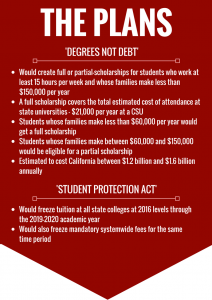As students and faculty lobby the Legislature to fully fund the California State University’s budget for the upcoming academic year after the Board of Trustees approved a tuition increase, some lawmakers have prioritized other proposals aimed at lowering college costs.
The California State University Board of Trustees passed the first tuition increase in six years on March 22 with the proviso that it will not go into effect if the Legislature fills a $168 million shortfall between the CSU’s and Gov. Jerry Brown’s budget proposals.
Ryan Brown, a Sacramento State student and the vice president of legislative affairs at the California State Student Association, has joined Sac State professor Christine Miller, the chair of the CSU Academic Senate, in visiting the Capitol to persuade legislators to do just that when it votes on the state budget.
“The governor is being very fiscally conservative this year and is really the biggest obstacle,” Brown said. “I’m not incredibly optimistic that the Legislature will come through.”
Brown said that the trustees, some of whom said they did not want to raise tuition but felt they had no other choice, have not been proactive in trying to prevent the increase from taking effect.
“They haven’t been in the Capitol with students or publicizing any actions they’ve taken to push for full funding,” Brown said. “(It) seems to me that the justification for the increase is that it would put pressure on the governor — but part of that has to be the trustees putting that pressure on themselves.”
Sacramento State alumnus and Assemblyman Kevin McCarty, D-Sacramento, said that he didn’t support the tuition increase, but that the Legislature’s move will depend on how much money the state received from taxes this spring.
“Obviously, we’d support that if there was an unlimited pot of money but we have to evaluate how much money we have and live within our means,” McCarty said in an interview with The State Hornet.

If passed, Brown’s budget proposal would increase the amount that the state is spending on the CSU system — by $157.2 million, according to a CSU memo — at a time when other state entities are facing budget cuts. Nonetheless, the increased funding is not enough to cover the amount that the CSU asked for.
McCarty, who sits on the assembly’s higher education committee, has joined forces with Assemblywoman Sharon Quirk-Silva, D-Fullerton, to push forward proposals that would ease the financial burdens of college for students.
McCarty has been advocating for a budget proposal, titled ‘degrees not debt,’ which would establish scholarships to cover the average cost of attendance at public universities.
Students participating would be expected to work 15 hours a week. Those whose families make less than $60,000 per year would have the full average cost of attendance — $21,000 per year in the CSU system, including expenses beyond tuition — fully paid for.
Students whose families make over $150,000 would be ineligible. Students whose families make between $60,000 and $150,000 would get a partial scholarship.
The proposal would cost between $1.2 billion and $1.6 billion annually, which has prompted skepticism about the proposal from the governor’s department of finance.
However, McCarty said that the program can be implemented over a number of years.
“We want to be responsible and don’t have the money to implement this program right now. But as you look down the road, there will be monies in the budget in the next couple years,” McCarty said. “It is doable to do this in the next few years piece-by-piece. Starting small, we can potentially do it over five years.”
Quirk-Silva, who has been working with McCarty, proposed Assembly Bill 393 in February. Dubbed the ‘Student Protection Act,’ the bill cleared a major hurdle by unanimously passing the higher education committee on April 18.
AB 393 would freeze tuition at all California public colleges through the 2019-20 academic year. Quirk-Silva said in an interview with The State Hornet that she came to the Assembly to focus on education matters.
“We have to invest in higher education and we need to make sure that we keep those tuition fees at a price that parents (and) students can count on,” Quirk-Silva said.
Quirk-Silva said that universities should spend money more efficiently to prevent tuition hikes.
“The education system in return has to look for cost savings (and) look for ways that they can do more with less just like we have to do in our own homes,” Quirk-Silva said. “Are there ways to save on administration? Are there ways to look at maybe programs that are outdated and that maybe need to be re-looked at?”
Brown, who ran against McCarty for the Assembly last November, said he is skeptical of both the ‘degrees not debt’ proposal and AB 393, and questioned whether they can be feasibly implemented.
Nonetheless, Brown, Quirk-Silva and McCarty all echoed a theme expressed by the latter.
“The more people pushing bills, pushing budget ideas talking about college affordability, the better,” McCarty said. “To get on the action item for California to do something, you have to have a lot of voices chirping.”































































































































